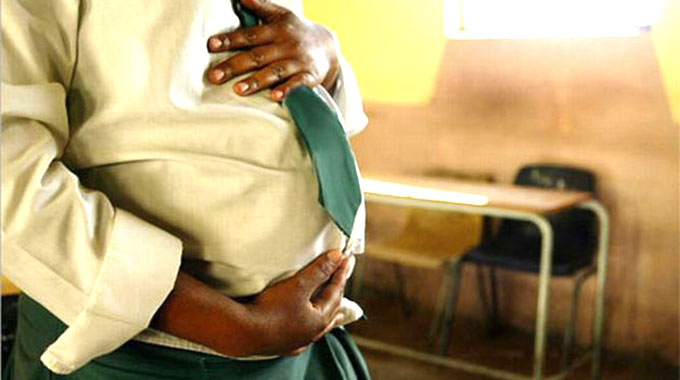EDITORIAL COMMENT : Reducing teen pregnancies needs holistic approach

COVID-19 and the measures needed to contain the spread of infection have put a lot of pressure on families, communities and children worldwide and in Zimbabwe, disrupting vital services and triggering the temporary closure of schools.
This worsened the plight of vulnerable children, especially girls, for whom accessing education and staying in school was hard enough.
The disruption of income-generating activities and resultant idleness of children because of Covid-19 did not make it any easier for girls to remain in school.
There are reports that hundreds of school girls have dropped out of school nationwide due to pregnancy, early marriages, financial constraints and illness.
On Monday, we reported that over 400 girls from four districts of Manicaland dropped out owing to a host of factors, including pregnancy.
Out of the country’s 10 administrative provinces, Manicaland appears to have consistently fared badly since 2017.
The current statistics, while not covering all the seven districts in the province, point to a worrying trend.
As figures trickle in following the resumption of lessons for examination classes on September 28, reports from several districts are pointing to a spike in the number of girls dropping out of school.
This state of affairs is unfortunate and must move stakeholders to craft policies and awareness programmes that encourage girls to remain in school and complete their education.
The Covid-19 lockdown — part of needed Government measures to prevent the spread of coronavirus which claimed the lives of hundreds of people globally and put the global economy on its knees, left schoolchildren idle.
This saw some engaging in immoral activities like drug and alcohol abuse and premarital sex.
Parents at a recent advocacy meeting on sexual education that was organised by the National Aids Council and held in the province concurred that some children had fallen pregnant during the lockdown.
They spelt out the need to enhance sex education in school as part of long-term measures to reduce teenage pregnancies.
Over the years, girls that usually fell pregnant while in school were usually below 17.
Because of their ages, they are often not mature enough to make informed decisions on sex.
Therefore the rate of unintended pregnancies and becoming infected with sexually transmitted infections including HIV has happened during these formative years.
With cultural practices and religion influencing how the girl child and the boy child value themselves, in districts like Makoni and Mutasa, girls could have been forced into early marriages and simply told to stay at home and wait to get married.
According to statistics from the Ministry of Primary and Secondary Education for Manicaland, in Chipinge 46 boys are said to have been married, while Makoni recorded 65 pregnancies and 64 marriages. Mutasa had 40 marriages.
Families do not only marry off their children to families that appear better than them in a bid to save their daughters from hunger, but also in order to buy an insurance against hunger.
The in-laws would feel an obligation to ensure the family they married into is also food secure.
Debts, divorce of parents, abusive family backgrounds, illness and poverty impact the education of girls, in the same way as adolescent misconduct and early teen marriages.
Less enlightened families do not immediately appreciate the value of investing in the education of their daughters.
Sadly, girls who get pregnant never fare well because they immediately fall under the microscopic view of society which views teenage mothers negatively and often associates them with lack of social mobility and poor educational attainment.
With all those negative tags heaped on a girl, her life is thrown into deep poverty abyss.
The consequential effects of teenage pregnancy are exceptionally heavy, hence the need for all stakeholders to climb on the deck and come up with strategies for life in and out of school to reduce teenage pregnancies.
Traditional leaders need to respect the country’s laws and move away from some cultural practices that promote marrying off young girls.
Those found perpetuating child marriages should receive deterrent sentences to curb the practice, which is not only archaic, but are also an albatross round the neck of girls trying to make their way in the world.
Government should continue to invest in social safety nets to ensure that children from disadvantaged families can continue to be in school. Some of the solutions to the problem of drop outs lie in the recent Education Amendment Act, which now needs to be implemented holistically to ensure that hundreds of previously marginalised pupils are assisted.
The amendment, which has since been gazetted into law, was passed by Parliament and assented to by President Mnangagwa, and is expected to restore girls’ dignity for those who would have fallen pregnant while in school by allowing them back in class.
The move fosters equality in cases where girls who fell pregnant were expelled from school, while the concerned boy continued with his education.
Contained in the same Act are provisions to ensure that students who have not paid school fees are not turned away from school, a development which should see a reduction in the number of pupils dropping out of school due to financial problems.
Essentially, the Act promotes the attainment of education for all, a goal that is consistent with the vision of the Second Republic.
Monitoring and evaluation of the Education Amendment Act should therefore be critical to ensure holistic implementation, without undue interference or failure to execute because of personal convictions that still regard pregnancy in school as morally wrong.








Comments